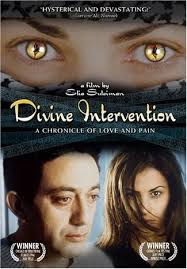
DIVINE INTERVENTION
Palestine/Israel, 2002, 92 minutes, Colour.
Elia Suleiman, Manal Khadir.
Directed by Elia Suleiman.
A film that defies easy and neat description. It is Palestinian (the director, Elia Sulieman lives in Jerusalem, his mother in Nazareth). It is critical of Israel and its treatment of the Palestinians even though Israeli actors have roles in it (as Israeli police). It is mainly droll but often very funny. And it is absurd - in the sense that Sulieman (who also acts the central role) starts with a Santa Claus being pursued up a Nazareth hill by a gang of youths and goes on from there with a succession of comic episodes that symbolise Palestinian life. Nothing much happens in Nazareth to speak of but a lot to laugh at. At the border near Ramallah, Palestinian lovers meet and keep vigil in the car park while the guards check vehicles and sometimes throw their weight around. A balloon with Yasser Arafat's face on it floats over Jerusalem. There is a thread of serious plot where our hero visits his dying father in hospital. Then, suddenly, there is what the credits call the 'Palestinian Ninja sequence' where the heroine shows she is capable of defeating all Israeli forces single-handed. The film ends with the hero and his mother watching an increasingly hot pressure cooker. Yes!
1. The impact of the film made during the Palestinian uprising and released with the tension strong between Israel and the Palestinians in 2002? Its contribution to understanding, to possible peace?
2. The title - its application, Muslim faith in Allah? The religious traditions of the Middle East?
3. The structure of the film: Santa Claus being pursued by the gang up the hill in Nazareth? Life in Nazareth, the small incidents, people being passive, nothing happening, observing? Petty neighbour difficulties? The collaborator and the drive-by attacks on his house? The transition to the checkpoint? People observing, the guards, the woman walking through? The Israeli police humiliating the drivers? The story of E.S. and his father collapsing, hospital, the visits, E.S. and his trysts with the woman in the car? The transition to the Palestinian Ninja sequence? The lone woman defeating the Israeli sharpshooters? The finale with E.S. and his mother watching the pressure-cooker boil?
4. The use of locations: the city of Nazareth and its streets and houses, the particular corner where most of the action took place? The vistas of Nazareth? The checkpoint, the road to Jerusalem? Jerusalem itself? The interiors, especially the hospital? The musical score, songs, the music of the Middle East?
5. The humour of the film: droll, understated, deliberate, slightly black, the funny sequences? The characters in their context? The balloon of Arafat over Jerusalem? The Ninja sequence? The Palestinian sense of humour? Offering it to Israel, to the world?
6. The sequences in Nazareth: the man driving down the street swearing at his neighbours waving at him? The man reading his mail and then collapsing, the neighbour throwing his rubbish and the woman throwing it back, the man at the bus stop when there is no bus, the man on the roof with his bottles and hurling them at the police, the boy with its soccer ball and its going on the roof and being punctured _
7. The father, hospital, Santa Claus? Everybody in the ward, the patients and the staff all smoking in the corridor? The old man, the visits of his son, their being together, his death?
8. E.S. and his meeting with the girl, their simply sitting at the border? Each going their own way? The woman walking through the border and the guards not shooting her? The tower collapsing? The man eating the apricot, throwing the seed and it exploding a tank?
9. The woman and the Ninja sequence, avoiding all the bullets, defeating the marksman, the trainer simply watching? Their techniques and the visual presentation of this sequence?
10. The finale with the man and his mother watching the pressure-cooker - symbolic?
11. The film as symbolic of the history of Israel and the Palestinians? Its observations on the Palestinians - and their passivity, yet their daring? The Palestinians living in Israel itself compared with those in the West Bank and Gaza Strip? A contribution to world understanding of the Palestinian situation?